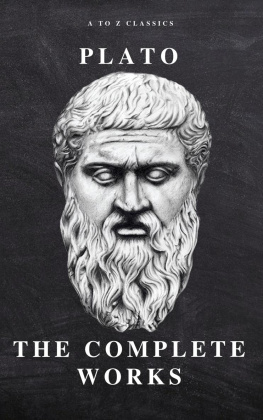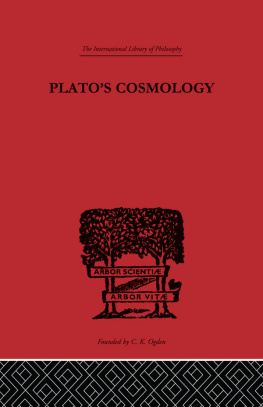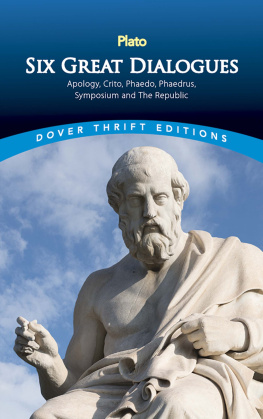PENGUIN BOOKS GREAT IDEAS
The Symposium
Plato
c. 429347 BC
Plato
The Symposium
TRANSLATED BY
CHRISTOPHER GILL AND DESMOND LEE
PENGUIN BOOKS GREAT IDEAS
PENGUIN BOOKS
Published by the Penguin Group
Penguin Group (USA) Inc., 375 Hudson Street, New York, New York 10014, U.S.A.
Penguin Group (Canada), 90 Eglinton Avenue East, Suite 700, Toronto,
Ontario, Canada M4P 2Y3 (a division of Pearson Penguin Canada Inc.)
Penguin Books Ltd, 80 Strand, London WC2R 0RL, England
Penguin Ireland, 25 St Stephens Green, Dublin 2, Ireland (a division of Penguin Books Ltd)
Penguin Group (Australia), 250 Camberwell Road, Camberwell,
Victoria 3124, Australia (a division of Pearson Australia Group Pty Ltd)
Penguin Books India Pvt Ltd, 11 Community Centre, Panchsheel Park, New Delhi - 110 017, India
Penguin Group (NZ), cnr Airborne and Rosedale Roads, Albany,
Auckland 1310, New Zealand (a division of Pearson New Zealand Ltd)
Penguin Books (South Africa) (Pty) Ltd, 24 Sturdee Avenue,
Rosebank, Johannesburg 2196, South Africa
Penguin Books Ltd, Registered Offices:
80 Strand, London WC2R 0RL, England
This edition published in Penguin Books (UK) 2005
Published in Penguin Books (USA) 2006
5 7 9 10 8 6 4
The Republic translation copyright H. D. P. Lee, 1987
The Symposium translation copyright Christopher Gill, 1999
All rights reserved
Reprinted from The Symposium, translated with an introduction
by Christopher Gill (Penguin Classics, 1999) and The Republic, translated
with an introduction by Desmond Lee (Penguin Classics, 1987).
ISBN: 978-1-101-65149-0
CIP data available
Printed in the United States of America
Set in Monotype Dante
Except in the United States of America, this book is sold subject to the condition that it shall not, by way of trade or otherwise, be lent, resold, hired out, or otherwise circulated without the publishers prior consent in any form of binding or cover other than that in which it is published and without a similar condition including this condition being imposed on the subsequent purchaser.
The scanning, uploading and distribution of this book via the Internet or via any other means without the permission of the publisher is illegal and punishable by law. Please purchase only authorized electronic editions, and do not participate in or encourage electronic piracy of copyrighted materials. Your support of the authors rights is appreciated.
The Symposium
APOLLODORUS : In fact, Im well prepared to answer your question. As it happens, the other day I was going to the city from my home in Phalerum, and someone I know spotted me from behind and called me from a distance. He said (with playful urgency):
Hey, the man from Phalerum! You! Apollodorus, wont you wait?
I stopped and waited.
He said, Apollodorus, Ive just been looking for you to get the full story of the party at Agathons, when Socrates, Alcibiades and the rest were there for dinner: what did they say in their speeches on love? I had a report from someone who got it from Philips son, Phoenix; but he said you knew about it too. He wasnt able to give an exact report. Please give me your account. Socrates is your friend, and no one has a better right to report his conversations than you. But before you do, he added, tell me this: were you at this party yourself or not?
It certainly wasnt an exact report you were given, I replied, if you think this party was recent enough for me to be there.
Yes, I did think that, he said.
How could you think that, Glaucon? Dont you know that its many years since Agathon stopped living in Athens, but its not yet three years since I started to spend my time with Socrates and made it my job to find out what he says and does every day? Before then, I used to run around aimlessly. I thought I was doing something important, but really I was in the most pathetic state just like you now! thinking that philosophy was the last thing I should be doing.
Dont make fun of me, he said; just tell me when this party took place.
When you and I were still children, I said, and Agathon won the prize with his first tragedy. It was the day after he and his chorus held a sacrificial feast to celebrate their victory.
So it really was a long time ago, he said. Who gave you your report; was it Socrates himself?
Certainly not! I said. It was the same person who told Phoenix, someone called Aristodemus from Cydathenaeum, a little man who always went around barefoot. He was at the party because he was, I think, one of the people most in love with Socrates at that time. But, of course, I checked with Socrates afterwards some of the points he told me, and he confirmed Aristodemus account.
Come on, he said, why dont you repeat this to me now? After all, walking on the road to the city gives us a good chance to talk and listen as we go along.
So as we walked along this is what we talked about, and thats why, as I said at the start, Im well prepared. If I need to go through it for you as well, thats what I must do. In fact, whenever I discuss philosophy or listen to others doing so, I enjoy it enormously, quite apart from thinking its doing me good. But when I hear other kinds of discussion, especially the talk of rich businessmen like you, I get bored and feel sorry for you and your friends, because you think youre doing something important, when youre not. Perhaps you regard me as a failure, and I think youre right. But I dont think youre a failure, I know you are.
COMPANION : Youre always the same, Apollodorus. Youre always running down yourself and other people. You seem to believe that simply everyone is in a sad state except Socrates, beginning with yourself. How you ever got the nickname of the softy, I dont know. In your conversation, youre always just the same as you are now, savage in your attacks on yourself and everyone except Socrates.
APOLLODORUS : Well, my dear friend, its quite obvious, is it, that if I take this view about myself and you, Im raving mad?
COMPANION : Its not worth quarrelling about this now, Apollodorus. Please, just do what I asked you, and tell me how the speeches went.
APOLLODORUS : All right, they went something like this but it would be better if I try to tell the story from the beginning, just as Aristodemus did.
He said that he met Socrates, whod just had a bath and put on sandals things he hardly ever did. He asked Socrates where he was going looking so smart.
Socrates replied, To dinner with Agathon. Yesterday I stayed away from his victory celebrations, avoiding the crowd; but I promised to join him today. Thats why Ive smartened myself up, so that I can look good when I go to the home of a good-looking man. But what about you? he asked. How would you feel about coming to dinner without an invitation?
Ill do whatever you say, Aristodemus replied.
Come with me, then, Socrates said, so we can prove the proverb wrong, and make it say: Good men go uninvited to good mens banquets. Homer, after all, doesnt just prove the proverb wrong but comes close to treating it with contempt. His Agamemnon is an exceptionally good fighter, while Menelaus is a soft spearman. But when Agamemnon sacrifices and holds a feast, he makes Menelaus, the inferior man, go uninvited to the banquet of a better man.
Aristodemus replied to this, But Im afraid that I will also match Homers description rather than yours, Socrates, and be the inferior man who goes uninvited to the banquet of a clever one. If you take me along, think about what excuse youll give; I wont admit Ive come uninvited, Ill say youve invited me.














